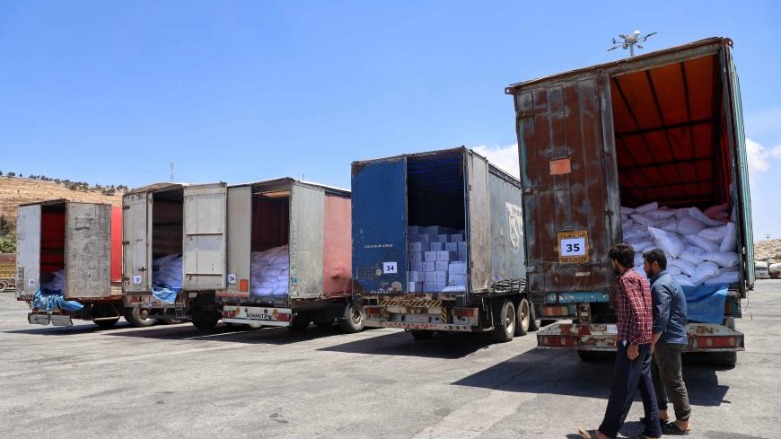Russia should not block cross-border aid to Syria: HRW
“Russia has threatened to use its [UN Security Council] veto power to shut down the entire UN cross-border aid program, making groundless claims that cross-border aid is no longer needed.”

ERBIL (Kurdistan 24) – Russia should not block the United Nations Security Council from reauthorizing and expanding cross-border humanitarian aid operations across northern Syria, the New York-based Human Rights Watch (HRW) said on Wednesday.
July 10 marks the expiration of the Security Council authorization for the Bab al-Hawa crossing on the Turkish-Syrian border, the last site where UN cross-border aid delivery is permitted.
Council members are discussing proposals for reviving all previously authorized cross-border aid points into northern Syria, including a vital lifeline for northeastern Syria.
Many countries including the United States have argued for restoring the al-Yaroubiya crossing point from Iraq in the northeast that was closed in January 2020 due to a Russian and Chinese veto.
“Russia has threatened to use its veto power to shut down the entire UN cross-border aid program, making groundless claims that cross-border aid is no longer needed,” HRW said.
Read More: Russia says Syria can deliver aid, Turkey not essential
Millions of people in northern Syria need cross-border distribution of food, medicine, COVID-19 vaccines, and other lifesaving assistance, HRW said.
“Ending cross-border aid would be tantamount to a death sentence for many of the millions of people in northern Syria dependent on humanitarian assistance,” said Louis Charbonneau, UN director at Human Rights Watch, said in the report.
“Russia should allow reauthorization of all previously approved crossing points for the north. Claims that the Syrian government is ready and willing to facilitate aid ring hollow, since it has long obstructed, not enabled, aid distribution.”
“The Russians do not want an indefinite American presence in Syria and want to force the SDF (Syrian Democratic Forces) to negotiate with Damascus with a weaker hand,” Nicholas Heras, a Senior Analyst and Program Head for State Resilience and Fragility at the Newlines Institute in Washington, D.C., told Kurdistan 24 on Wednesday.
“Assad has significant economic leverage on the SDF through cross-line trade inside Syria. Russia would only agree to open up Yaroubiyah if it knew the Americans were on a path to withdrawing from Syria in the near future.”
Abdulkarim Omar, the foreign relations co-head of the local administration in northeastern Syria, told the local Hawar News Agency (ANHA) that, if Russia uses a veto again, “the international community should seek alternatives to deliver aid to north and east Syria."
Charles Lister, an analyst at the Middle East Institute, in a tweet said that Russia and China are demanding that the US and EU lift sanctions on the Syrian regime and expand cross-line operations in Syria. “That's not likely to be met with agreement.”
However, he said “the largely unanswered dynamic at play is the Russia-Turkey relationship -- an end to cross-border aid would represent an extraordinary crisis for Ankara -- & it'd deal a major blow to its delicate relationship with Moscow. I'd be surprised if Russia risks that eventuality.”
While Turkey does not mind for UN aid to be continued to be cut-off to northeastern Syria (or a continued closure of the SDF-held Yaroubiya crossing to northeastern Syria), Turkey will oppose the end of UN aid through the Bab al-Hawa crossing, which would negatively affect groups backed by Turkey in northwestern Syria.
“The UN Security Council should not delay the deployment of COVID vaccines in northeast and northwest Syria,” US Ambassador Linda Thomas-Greenfield to the UN, told reporters on Tuesday.
“In the midst of a pandemic, how can we possibly justify closing a reliable delivery route for vaccines?”